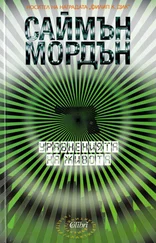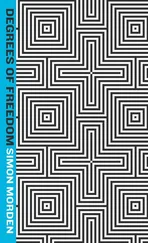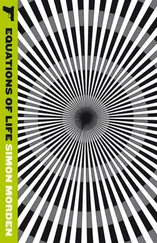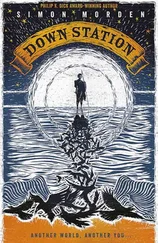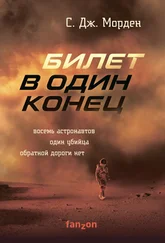Before what? He still didn’t know. He had to find out. He picked up his rifle and feeling less brave than at any time in his life, he started jogging towards the buildings.
There was a torch strapped to the top of his weapon. He tried it. The beam was momentarily bright, then it just faded away to a pale glimmer. Thacker hit the torch once, twice, and the glow died.
It was cold and dark. He knew where the sun should be in the sky, and it just wasn’t there anymore. There was a faint greyness to the sky, enough to see shapes, too little to see detail. It would have to do.
As he ran, he kicked up spurts of dust that hung in the air like fog.
The stables were off to his left, along with the workshop. Ahead of him was the hall itself, a fat shadow with tall chimneys like teeth. It was only gothic revival architecture, but in the gloom it looked plain evil.
Thacker made it to the front door, a heavy wooden portal studded with iron nails. The door was ajar, the latch operated by the heavy ring seemingly frozen in the open position.
He put his shoulder to it. The hinges creaked like gunshots, and he immediately desisted. There was no one there. They’d all gone, all been lost, all he’d find were corpses. He pushed again, and slowly, reluctantly, the door crawled open. He took a few moments at the threshold for his eyes to adjust, then raised his rifle and stepped in.
He listened very carefully. The only sound was his own heart. The entrance hall was on a grand scale, with a staircase directly ahead of him leading up to a balcony that led both left◦– west◦– and right◦– east. According to Emily Foster’s testimony, the household lived in the east wing. The phenomenon was centred on the other side of the house.
West it was, then. He climbed the stairs two at a time, glancing behind him every so often at the pale rectangle of the open front door. How nice it would be to just cut and run, except the retreating field would have left his body board behind like the retreating tide. There was only one way out now.
He was on the landing. The doors everywhere were open, gaping mouths of darkness that led into the rooms beyond. The world beyond the windows was barely visible. He turned, checked his back again, and went through into the west wing of the house.
A carpet, a runner that didn’t stretch to the edges of the corridor, seemed to crumble with each step he took. The passage stretched almost the whole length of the wing. There were lots of doors, all open, and the occasional table with a vase of sticks and paintings too dark to determine the subject matter. And something underfoot, like stones. He checked above him for fallen plaster, but found none.
He worked his way down, checking each room with a kick and a crouch and a pan of his rifle sights. By the time he reached the last room, his nerves were in shreds and gripping his rifle would have been impossible if not for his rubber gauntlets: his whole body was swimming with cold sweat.
This room was different. Every other room had been bare, stripped out: no curtains or carpets or furniture. This at least had a writing desk and a chair, and in the corner, a naked iron bedstead. He had to assume it was significant. There was also another door in the west wall. Open, of course.
He used the wall for cover, noting briefly that there were papers, a notebook perhaps, on the desk. He’d come back for those later. His back pressed against the plasterwork, he edged around the room. How much time did he have, if any at all? He stood next to the door frame, and then turned, kicked and crouched.
There it was. It had to be the reason. Thacker looked all around the room, checking the shadows for movement, then moved closer.
It was just taller than he, and as broad at the base as it was high, a brass cone knotted with pipes and coils that danced through and out without meaning. Its surface was hammered with shapes, strangely familiar yet utterly alien. There was a control panel of sorts, too, with heavy levers.
And it was humming with power.
He circled it twice, and realised that there were no cables to trip over. Poor on history, he wasn’t sure whether houses in 1919 had electricity, and how it could have been hooked up to the National Grid for the past eighty years. He reached out and touched it. He could feel a soft vibration in his palm.
The thing itself was alive.
He backed out through the door, reluctant to turn his back on it, and collided with the desk. He jumped, cursed himself for being stupid and cowardly, and bent to retrieve some of the papers that had fallen to the floor.
They were thick with writing, and Thacker could barely make out the fine, copperplate script. But there were diagrams, more drawings of symbols◦– abstract designs, stylised people and birds◦– and a huge folded sheet like a map, except that it was a wiring diagram the likes of which he had never seen.
He looked again at the pictures. They seemed Egyptian: hieroglyphs.
Then two things: he realised that it was growing lighter outside, and there was a creak of floorboards in the corridor. He’d been standing there, with his back to the door. He dropped to his knee and aimed. Something moved, and was gone. Footsteps, running.
He turned the corner in time to see nothing more than a shadow at the far end of the corridor. Distracted by the sight of the light coming in from the windows, he missed his chance to call out a warning, or even snap off a shot.
Sunlight streamed across the blasted parkland turned grey, and beyond he could see green trees and fields of unripe wheat. There was blue sky. The forcefield had collapsed, and he hadn’t even noticed.
Now, when his radio would work, he didn’t have it. He had to assume that soldiers would now be coming down the main drive, fanning out through the building, and that he could quite easily be shot by someone on his own side. Very easily, assuming they were as spooked as he was.
He didn’t run. He stalked. Whoever◦– whatever◦– he was chasing would know the hall intimately. Every hiding place, every twist and turn, every concealed passageway. Thacker had trained for this; not recently, but often enough in the past for the training to have stuck. Weapon out in front, finger on the trigger, and slowly.
He gained the balcony overlooking the entrance, and barely recognised it. The light, previously denied, showed plain wooden panelling, yellowing whitewash walls and dusty boards. Nothing to be scared of, really.
Coming down the stairs, he listened. Outside, he could hear in the distance the sound of a large engine revving. The Warrior would be advancing, with a column of soldiers behind it. Inside, there was the scraping of something heavy across the floor, dragged in short steps. He quickened his pace, crossed the entrance hall, and touched one of the big double doors.
He caught a glimpse of a huge banqueting room, big leaded windows, massive stone fireplace, and a towering, teetering bonfire of broken wood in the very centre of the space. In the corner was an upturned table, and on top of the edge was the barrel of a shotgun aimed at him.
As he stepped back, the gun fired, booming in the confined space. The door quivered as buckshot punctured the dense wood. He was through the door, rolling, looking for cover, even as he fired a burst of three into the corner. The shotgun boomed again. Plaster dust trailed the chalk-white chunks of wall as they arced to the floor.
Thacker had put the wood-pile between him and the table. He kept it in line as he moved cautiously forward. A shot hit the fireplace off to his right. Sharp shards of stone zipped through the air. Several hit Thacker, hard enough to hurt, not enough to cut his suit. That hadn’t been a shot gun; a rifle instead.
He cleared his throat.
Читать дальше

![Саймон Морден - Билет в никуда [litres]](/books/388091/sajmon-morden-bilet-v-nikuda-litres-thumb.webp)
![Саймон Морден - Билет в один конец [litres]](/books/395533/sajmon-morden-bilet-v-odin-konec-litres-thumb.webp)


